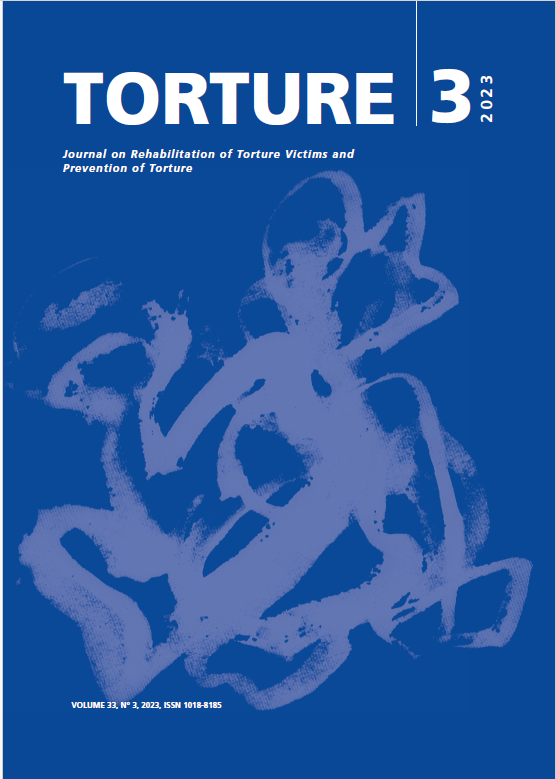Tales of resilience: voices from detention and imprisonment in Russia
DOI:
https://doi.org/10.7146/torture.v33i3.136085Keywords:
agency, inequality, disciplinary practices, empowermentAbstract
As the exposure to state violence could have long-term negative consequences on
the survivors, we analyzed which optics and measures could be used regardless of the
vulnerabilities of the individual, their social status and institutional context. We examine the ways in which law enforcement system challenges individuals and measures used to practice resilience. We use the concept of resilience within
torturing environment to achieve our goal. Various actors of Russian law enforcement
and penitentiary systems – detainees and prisoners, their family members, human rights activists, state agents etc. – participated in semi-structured in-depth interviews, which we coded basing on grounded theory. Measures employed by survivors to exercise resilience involve regaining bodily control (both by exercise and self-harm), having projections for future (by threats of legal prosecution or publicity), exploiting bureaucracy to one’s advantage, controlling information flow (by bluffing), controlling material evidence, employing allies and preserving the meaning of “normal self”.
We believe that our findings can have practical applications, e.g. for preventing some of the negative consequences of torture by training vulnerable individuals to employ resilient strategies. Describing the way to interpret the power imbalances inherent to the torture environment might also be helpful for appreciating even the smallest acts, including the choice not to act.
References
Bocharov, T. & Moiseyeva, E. (2017). Byt’ advokatom
v Rossii: sotsiologicheskoye issledovaniye professii
[Being a lawyer in Russia: a sociological study
of the profession]. St Peterburg.: Yevropeyskiy
universitet v Sankt- Peterburge.
Catucci, S. (2018). The prison beyond its theory
between Michel Foucault’s militancy and
thought. In Johnsen, B., Giofrè, F., & Fransson,
E. (Eds.), Prison, Architecture and Humans (pp.
-342). Cappelen Damm Akademisk/Nordic
Open Access Scholarly Publishing.
Clair, M. K. (2018). Privilege and punishment:
Unequal experiences of criminal justice (Doctoral
dissertation).
Daly, L.M. (2020) Resilience: An Integrated Review.
Nursing Science Quarterly, 33(4), 330-338
Decisions of Council of Europe from 16th
of March, 2022. Retrieved from https://
search.coe.int/cm/pages/result_details.
aspx?objectid=0900001680a5d7d9
Endreß, M. (2015). The Social Constructedness of
Resilience. The Social Sciences, 4, 1-13.
Foucault, M. (1995). Discipline and punish: the birth
of the prison. 2nd Vintage Books ed. New York,
Vintage Books.
Frankl, V. E. (1959). Man’s search for meaning. Boston:
Beacon.
Gudkov, L., Zorkaya N. & Kochergina Y. (2019).
Pytki v Rossii: rasprostranennost’ yavleniya i
otnosheniye obshchestva k probleme [Torture
in Russia: the prevalence of the phenomenon
and the attitude of society to the problem]. M.:
Levada-Tsentr. Retrieved from https://pytkam.
net/wp-content/uploads/2020/09/analiticheskiy_
otchet_final-2.pdf
Genprokuratura obnaruzhila massovyye narusheniya
vo FSIN pri primenenii sily k zaklyuchennym
[The Prosecutor General’s Office discovered
massive violations in the Federal Penitentiary
Service when using force against prisoners].
(2019). Kommersant, Proisshestviya. Retrieved
from https://www.kommersant.ru/doc/3939066
Hannah-Mofat, K., & Maurutto, P. (2012). Shifting
and Targeted Forms of Penal Governance: Bail,
Punishment and Specialised Courts. Theoretical
Criminology, 16 (2), 201–219.
Keene D.E., Smoyer A.B., Blankenship K.M. Stigma,
housing and identity after prison. The Sociological
Review, 2018, vol. 66, iss. 4, pp. 799–815.
Koenig, K.A., Stover, E. &Fletcher, L.E. (2009),
The cumulative effect: a medico-legal approach
to United States torture law and policy. Essex
Human Rights Review, 6(1), 145–168.
Lavie, S. (2014) Wrapped in the Flag of Israel: Mizrahi
Single Mothers and Bureaucratic Torture. New York:
Berghahn.
Omelchenko, E. (2016). Krasnyye i chernyye:
gendernoye izmereniye struktur razlichiya i
isklyucheniya v muzhskikh koloniyakh [Reds and
Blacks: The Gender Dimension of Structures
of Difference and Exclusion in Male Colonies].
Zhurnal sotsiologii i sotsial’noy antropologii, 19(2),
-158.
Pallot, J. (2005). Russia’s penal peripheries: Space,
place and penalty in Soviet and post-Soviet
Russia. Transactions of the Institute of British
Geographers, 30(1), 98–112.
Pallot, J., Piacentini, L., & Moran, D. (2012). Gender,
geography, and punishment: The experience of women
in carceral Russia. Oxford University Press.
Pérez-Sales, P. (2020) Psychological torture.
In P. Malcolm D. Evans & Jens M. (Eds.),
Research Handbook on Torture: Legal and Medical
Perspectives on Prohibition and Prevention (pp. 432-
. Cheltenham: Edward Elgar Publishing.
Piacentini, L. & Pallot, J. (2014). ‘In Exile
Imprisonment’ in Russia. British Journal of
Criminology, 54(1), 20–37.
Power, J., Goodyear, M., Maybery, D., Reupert, A.,
O’Hanlon, B., Cuff, R., & Perlesz, A. (2016).
Family resilience in families where a parent has
a mental illness. Journal of Social Work, 16(1),
-82.
Rampin et al., (2021). Taguette: open-source
qualitative data analysis. Journal of Open Source
Software, 6(68), 3522, https://doi.org/10.21105/
joss.03522
Shankar, A., Cherrier, H., & Canniford, R. (2006).
Consumer empowerment: a Foucauldian
interpretation. European Journal of Marketing,
(9/10), 1013–103.
Runova, K. (2019). ‘Neumestnaya’ gumannost’: kak
rabotayut vrachi v penitentsiarnoy sisteme Rossii
[“Inappropriate” humanity: how doctors work
in the Russian penitentiary system]. Zhurnal
issledovaniy sotsial’noy politiki, 17(3), 345–358.
World Prison Population List, 2021. Retrieved from
https://www.prisonstudies.org/sites/default/files/
resources/downloads/world_prison_population_
list_13th_edition.pdf
Downloads
Published
How to Cite
Issue
Section
License
Copyright (c) 2023 Torture Journal

This work is licensed under a Creative Commons Attribution-NonCommercial-NoDerivatives 4.0 International License.
We accept that some authors (e.g. government employees in some countries) are unable to transfer copyright. The Creative Commons Licence Attribution-NonCommercial-NoDerivatives 4.0 International (CC BY-NC-ND 4.0) covers both the Torture Journal and the IRCT web site. The publisher will not put any limitation on the personal freedom of the author to use material contained in the paper in other works which may be published, provided that acknowledgement is made to the original place of publication.


